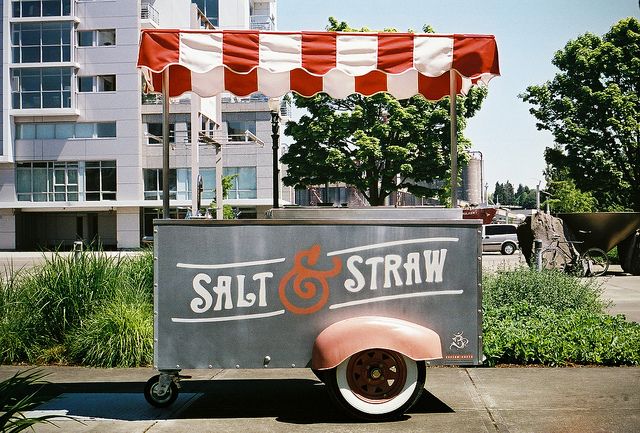[ad_1]
In the Shondaland series The First Time, you’ll hear intoxicating tales about trips to new places and nuanced narratives about nerve-racking but rewarding career shifts. You’ll also step into stories in which what people believed to be true was challenged when experiencing something for the first time. Through it all, we hope you see that, no matter what’s next, there’s always a lesson to be learned
Kim Malek isn’t sure if she fully believes in fate. As co-founder of the indie ice cream brand Salt & Straw, she explains it wasn’t a magical hand that led her transition out of the corporate world and into life as an entrepreneur in 2011. Instead, she credits the people around her who encouraged her to move into a line of work that better fit her passion for community building — even if, at the time, her plan was to own only a single store in Portland’s Alberta Arts District rather than a chain with locations across the West Coast and Florida that would come to count Dwayne “The Rock” Johnson among its shareholders.
“Call it fate or a collection of people,” she says. “This community of people surrounding me have helped me take the first step at the right time.”
Although Malek’s pre-Salt & Straw résumé includes time spent at (RED), Starbucks, and Adidas — companies, she notes, that put her in the position of constantly introducing something new — she recalls needing an extra push to finally start a small business for the first time. It can be intimidating to do something new, even more so when it involves shifting your work identity and means of income. For Malek, when she discovered that another entrepreneur had started a like-minded company, she worried that she might be too late to make an impact. But after her now-husband simply told her, “Well, why don’t you just do it,” Malek took the leap. A close friend also helped her past the fear of worrying what people would think when she left her successful day job, despite the fact that Malek’s carefully drafted business plan was already a decade old.
“There’s all these studies out there that especially women will perfect something before they bring it to the world,” Malek says. “I remember I sat across the table at this greasy-spoon diner from this woman named Sarah Masoni, who is a food scientist I’ve known forever. I was like, ‘I have something I think I want to do. Um, it’s probably a bad idea, but I think I might try it!’ And then it went on and on, with me stuttering and stammering and finally admitting that I wanted to set up an ice cream company and ice cream shop. And Sarah just looked at me and she said, ‘I will help you.’”
With support finally behind her, Malek was ready to set foot on her first small-business venture. Salt & Straw began as an ice cream cart in Portland’s Alberta Arts District, where Malek herself posted up day in and day out to scoop their chef-driven, small-batch, sustainable flavors — conceptualized by her cousin and co-founder, Tyler Malek — for potential customers.
Kim believed in their product, but figuring out how to go from a pushcart to a profitable small business took grit — and a little bit of serendipity.
Kim recalls a day, six weeks into her new career, when a reporter from The Wall Street Journal called her and said she wanted to write a piece on Salt & Straw, but there were caveats: Kim needed to send the reporter more ice cream to try, and according to the reporter’s editor, Salt & Straw needed to have national distribution — both tall orders for a brand operating from a city park. And the article would run in three weeks.
But both Maleks pushed through the roadblock and, in those three weeks, Googled how to launch an online shop, sourced a supplier for both dry ice and shipping materials, and launched an e-commerce shop so they could meet the reporter’s requirements. The article ran, touting Salt & Straw’s vanilla flavor as the new gold standard, and not only did orders start pouring in, but Kim and Tyler also successfully expanded their business.
The next step was opening a physical space, which was integral to Kim’s vision for Salt & Straw. There were lean moments, for sure. Kim started seeking funding for her small business in 2009, smack in the middle of a recession that had many banks and lenders wary of investing in any start-ups. Realizing she had to go at it alone, Kim cashed in her retirement fund, sold her house, took out a loan, and even held a garage sale to build the funds that would make their first physical location a reality.
With funds and experience behind her, Kim, alongside Tyler, then a culinary student who taught himself how to make ice cream on a machine they sourced from Goodwill before joining Salt & Straw as the head ice cream maker, began crafting a different approach to the traditional scoop shop. Taking what she learned at Starbucks around its idea of “the third place” — as in, not your home or office but another space that can serve a personal purpose — Kim, at Salt & Straw, encourages guests to linger in their brick-and-mortar spaces (they have an unlimited samples policy) to create a sense of community within the store. They also offer a flavor range where classics like Double Fold Vanilla and Sea Salt With Caramel Ribbons sit side by side with regional specialties like Pear & Blue Cheese and Arbequina Olive Oil. And it’s all sourced from local suppliers.
There’s also a sometimes adventurous limited-edition flavor menu, which in the past has included everything from bone marrow to sea urchin to duck. Malek has always seen both Salt & Straw’s regular rotation of flavors and one-offs as a chance to practice a storytelling-first approach to the business. In June, she excitedly explains, they’ll become the first chain to have a fully certified upcycled special menu. Among the one-of-a-kind flavors is a scoop made from upcycled dairy seltzer, a beverage made from whey by-products that would otherwise be disposed of. While a lesson in food waste may not usually be on the menu when going out for dessert, she’s excited to offer customers more than their favorite sweet. It’s an experience of “firsts” that makes Salt & Straw a continual draw for new customers.
“We plan to have a more ongoing commitment to upcycling, but we’re starting off with this June menu, so it should be fun,” Malek says. “I always wanted to go into politics. I love causes and community and really pushing the boundaries when it comes to societal issues. And what I love is being able to use business to do that. And so, this is an example of things that really get me fired up. Business really is just storytelling and appealing to emotion and common sense.”
Perhaps part of Salt & Straw’s success is Malek’s lack of attachment to a traditional road map. “My favorite piece of advice to people is to not take advice,” says Malek, who has seen her father attempt to run his own business, fail, and reinvent himself. If that same thing happened to Malek, how bad would it be?
Malek also ensures that Salt & Straw remains committed to their employees, who are the backbone of their operational success. Take, for instance, when they opened their second store location. With Salt & Straw then operating as an ice cream shop, bakery, and coffee shop, employees on nearly every level soon reached burnout. Rather than crack the whip harder, Malek chose to step back, reevaluate, and restructure the store and their business model in order to get their teams back on track. It meant eliminating the bakery and coffee portions of their stores, but in the end, it not only led to happier and more productive employees but also to overall business growth once they focused on the crux of their success: the ice cream.
Adaptation, adjustment, taking action — for the first time in a new career, avoiding stagnation is key, and Malek, with Salt & Straw, knows those benefits firsthand. “I’m a person who really likes change,” Malek says. “Salt & Straw is probably the longest I’ve ever done anything. I’m now about as long as I was at Starbucks, so those two are the longest chunk of my life. But I like change. So, it’s not scary — it’s, I think, exciting and invigorating. In owning your own company, there’s that constant change. That really fuels me.”
Laura Studarus is a Los Angeles-based travel writer who has contributed to Fast Company, BBC Travel, and Thrillist.
Get Shondaland directly in your inbox: SUBSCRIBE TODAY
[ad_2]
Source link


